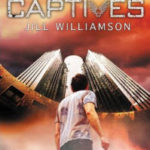SFF Friendly Editors Do Exist: An Interview With Andy Meisenheimer
As I announced on Friday at A Christian Worldview of Fiction, we have the privilege here at Spec Faith of an exclusive, first-time interview with Zondervan acquisitions editor Andy Meisenheimer.
I didn’t discuss this with him, but I’m hoping he will drop by Spec Faith and answer your questions. At any rate, we’d love to have you comment—let him know what you think of Christian science fiction and fantasy and about having another SFF friendly editor in Christian publishing.
– – –
RLM: Andy, I really appreciate you taking the time for this dialogue. I know writers who haven’t met you are curious about this new Zondervan editor who likes science fiction and fantasy. Maybe you can tell us first about your background—where you were born, grew up, went to school, that sort of thing.
AM: Sure. I was born in St. Louis, MO. Middle child of three boys. Grew up in central Illinois. Took piano lessons since second grade, made it into Wheaton Conservatory of Music as a piano performance major. Graduated, though, with a BA in English Lit—the music program and I didn’t get along so well. I wanted to learn guitar and bass and percussion and play with the theater group and the worship teams, they wanted me to sit alone in a 4×4 room with a grand piano and plunk away at some dead guy’s music for a couple of hours a day. I like music by dead guys, but they’re boring companions.
We’ll be moving to Grand Rapids soon to join the fine people at Zondervan once our adoption is finalized. We have a beautiful little boy in Guatemala (born 4/18/06) who is waiting very patiently for his new mom and dad to come and bring him home.
RLM: Adopting a Guatemalan! Now you’ve hit a soft spot with me since I spent some time there. But we’re not talking about me, right? ![]() Tell us how you became a Christian.
Tell us how you became a Christian.
AM: Well, heck, I’m one of those people who kinda grew up without a definable moment of “becoming” a Christian. And in the end, I’ve experienced enough of God that I can’t ever become an atheist. But my spiritual journey was born out of life with a Christian family: summer camps, youth groups, being excused from sex ed, Michael W. Smith 2, Baker Street Sports Gang, that sort of thing. Since then I’ve become a Calvinist and then Pentecostal and then Episcopalian, with a few other things scattered in-between. But you know, I like to meet God in more unusual places. I see God when I’m with my mom and dad and experience how he turned frustrated angry parents and a rebellious little boy into the best of friends. I see God when I’m with my wife and we cover over each other’s mistakes and occasional bad attitudes with love. I see God when my puppy dogs cuddle up against my legs as I read, even if I may have momentarily yelled at them no barking, I’m on a conference call.
RLM: You yell at your puppy dogs? That must make you … like the rest of us. And here we thought editors all walked on water. ![]()
You’ve been married six years, I understand. How did you and your wife meet? (Everyone loves a love story, right?)
AM: We met at Wheaton. I was the cute (so I’ve been told) redheaded piano player for the campus worship team; she, the gorgeous alto vocalist with curly hair. I’d play the piano, and she’d sit next to me on the bench and sing. Then we’d get out the book of Psalms and start making up our own songs … late into the night. And we fell in love. It seems so long ago; now we’re even better friends, even more in love; we are Netflix addicts, especially when it comes to TV shows (The Office, The X-files, Firefly, Dead Like Me), we read together, we like to hike, we love our dogs, and we like to veg out on Playstation 2. You want a fantasy fan, Mandy can’t get enough of the Gauntlet and Baldur’s Gate series. Oh, did I mention that? Mandy and Andy. Our names rhyme.
RLM: ![]() Now that’s perfect for a love story.
Now that’s perfect for a love story.
What put you on the path to becoming an editor? Is the job what you expected so far?
AM: Well, I’ve always read books. I read even before I went to school; I had (still have) a stack of those read-along records and each day I would go through every single one until I figured out what the words meant. Growing up, my parents would only let me read approved titles, so I read everything in my local Christian bookstore that my parents would buy. (Also, my folks were okay with the Hardy boys and Shakespeare.)
Once I hit high school, I started visiting the library on my own and reading what I wanted to read. I wrote a lot of stories, though I have no idea where they are now. From there I went on to study English lit at Wheaton. I got a job at the local Christian bookstore, and when I graduated Wheaton I became the book buyer at that store. Here’s where you start seeing the editor in me: I would take Advance Reader’s Copies of novels, get out my pen, and start scribbling comments and changes throughout. I think I even dared once to send the book back to the publisher. I really hope it wasn’t Zondervan.
When my Zondervan sales rep left, I applied for his position. And that’s where I’ve been for the past three years, as the Illinois-Wisconsin-Minnesota sales rep for Zondervan. Honestly, from day one at Zondervan I wanted to be an editor here, and I believe that within a few months I said as much to the person who is now my boss. So if there’s one lesson I’ve learned, it’s: be bold. What’s the worst that could happen. And I love my job. No regrets.
RLM: In your ACFW conference bio, you mentioned an interest in speculative fiction. What are your favorites and when did you first realize SFF had a pull on you?
AM: Very short list of favorites, mostly for their spiritual value, includes Orson Scott Card, Mary Doria Russell, Ray Bradbury, Stephen Lawhead, Madeleine L’Engle, Red Mars, Harry Potter and the Goblet of Fire. I’m constantly trying to read more of both genres; I constantly get stuck on one author and end up ignoring many more. For instance, I’m listening to OSC’s The Worthing Saga right now, and I have Ender’s Shadow as the next on my list. I gotta branch out more, I know. I find that sci-fi gets tiresome when it is so scientific that it denies any spiritual possibilities. And fantasy, on the other hand, gets tiresome when it works so hard to have spiritual possibilities.
I understood the genre better when I took Modern Mythology at Wheaton. I think if we’re all honest, unless we’re intellectually blocking it, all of us respond on a gut level to myth.
RLM: Mmmm. I couldn’t agree more and have my own theory why that might be so. There could be a future blog post in that topic.
What future do you see for SFF written from a Christian worldview?
AM: If it’s good SFF, then it doesn’t matter what worldview it’s from, it’ll last. If it’s bad SFF, then it doesn’t matter what worldview it’s from, it’ll disappear.
I worry sometimes about CSFF. In today’s world, we’ve taken the great CSFF, namely Lewis and Tolkien, and even pop SFF, such as Harry Potter and the Matrix, and boiled them down to allegorical or symbolic moments. We pick apart the lives of these characters and their stories, defining them as meaningful God-moments or throwaway not-God-moments, and then try to construct our own CSFF around all God-moments. But life—every single part of it, every stroke of the paintbrush—is God-moments. And fiction that tries to discern a non-God-moment and erase it from the possibilities is missing part of the painting.
RLM: I agree that all of life is made up of God-moments. I like the way you phrase that, but I’ll need to think about how that looks in fiction.
A number of Christian SFF writers have opted to self-publish or to sign with a small or POD publisher. Do you think this movement will help or hurt CSFF with traditional CBA publishers and why?
AM: There are lots of other people out there much more qualified to answer this. But I think you’ll see as a whole that self-publishing or POD publishers are great if you’re convinced that you have the best manuscript you’ll ever have, you’ve made a noticeable contribution to the genre, you’re going to personally sell many thousands of copies of the book, and you want to try to get noticed by a big publisher for your next book. If you’re just going to sell 500 copies, why not wait until you get yourself a contract and a publishing house to back you with editorial, marketing, publicity, sales, design, etc.?
RLM: What do you think CSFF writers should be doing to enhance the status of speculative fiction?
AM: Write really good SFF. People already read it, watch it, and listen to it, so it’s just a matter of getting enough really good SFF, written by Christians, out there.
RLM: What advice would you give to a CSFF writer?
AM: Number one, know the genre, and I mean outside of the CBA know the genre. The SFF that’s going to be successful is SFF that can stand on its own outside of the Christian worldview. If you’re not more well-read than I am, then I worry about you, because I’m terribly under-read.
Two, challenge the genre. Not every sci-fi is about light speed travel in the 2200’s. Not every fantasy has elves and castles. There’s pulp, pop, literary, techno, cyber, chick-lit, romance, spy, mystery, conspiracy versions of SFF (to name a few). There’s so much possibility to play with genres that I wouldn’t be surprised if the next big CSFF hit was more The Time-Traveler’s Wife than The Lord of the Rings.
Three, take note; many SFF authors don’t even intentionally put Christian elements in their books, but we, as Christians, still see them. Meaning: you could probably write like a ‘heathen’ SFF writer and still come up with something that would still be spiritually meaningful. God is ‘found’ in powerful stories with rich characters, more than he is found in explicit Christian content, symbols and allegory, and character conversions.
RLM: Great to get to know you better, Andy. Again, I appreciate your willingness to fit this into your schedule.









































